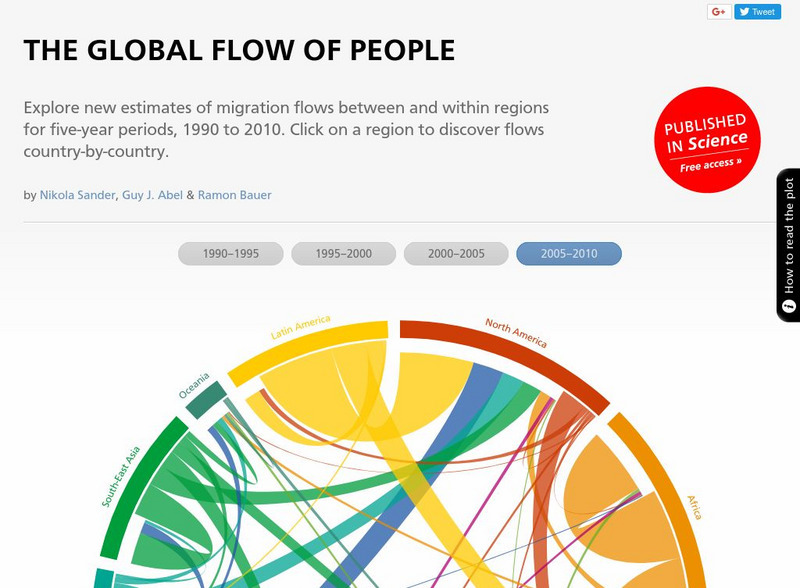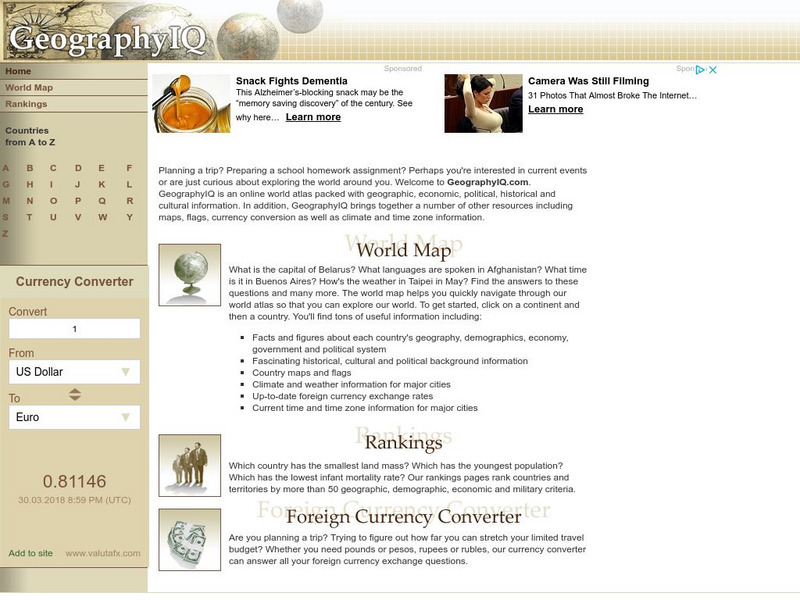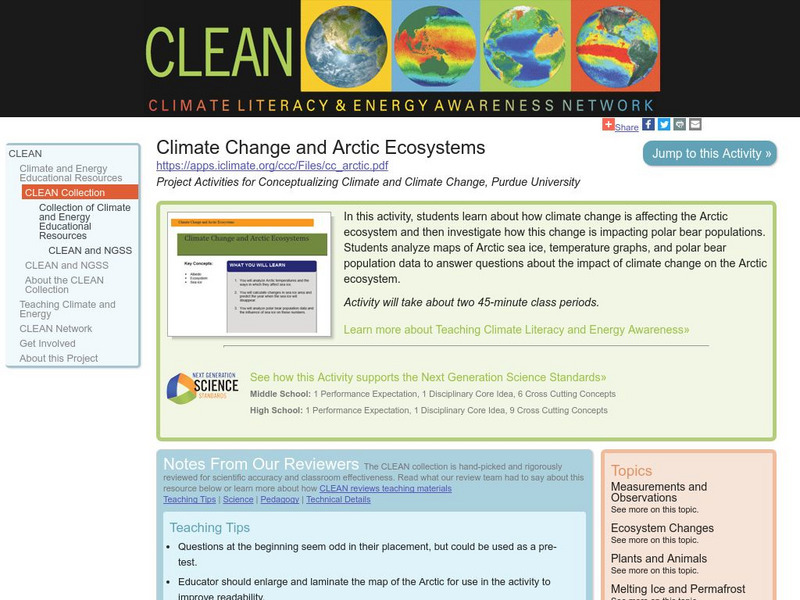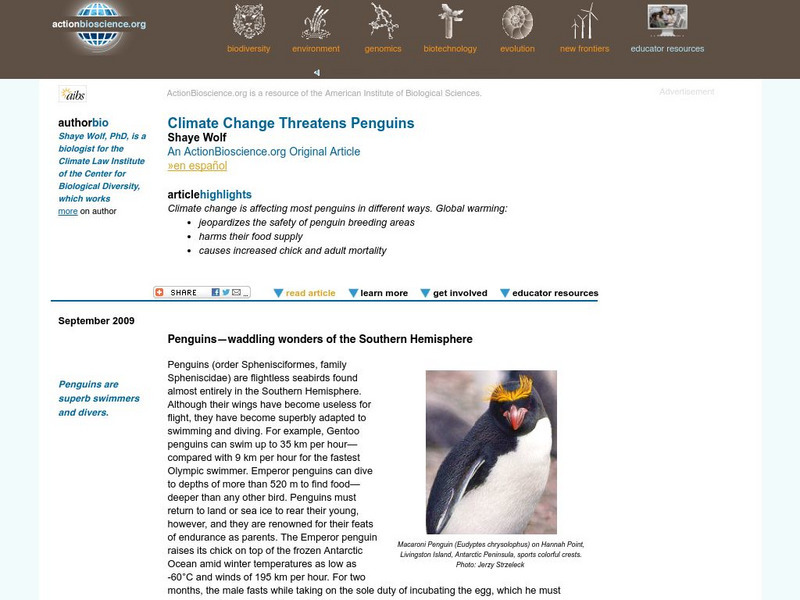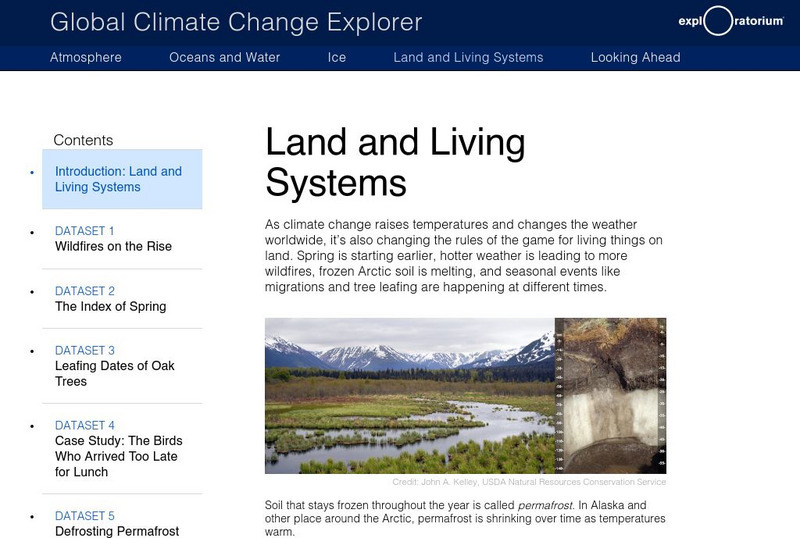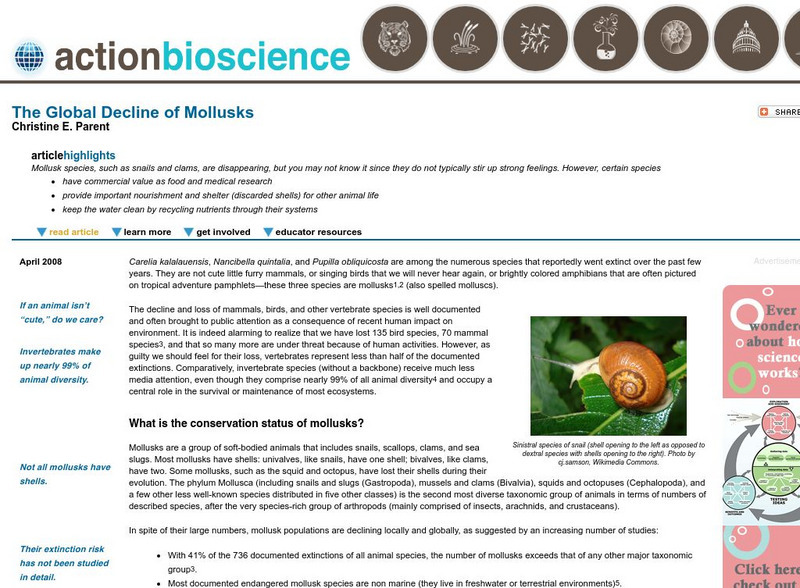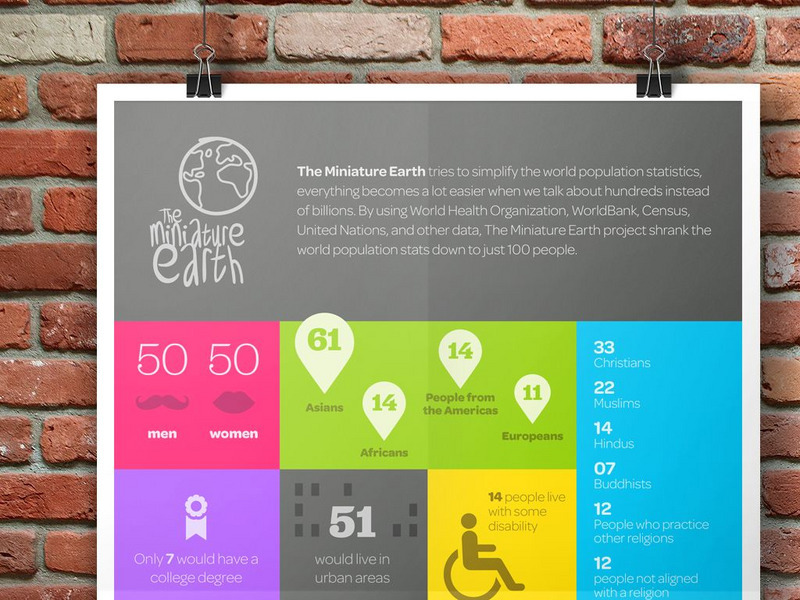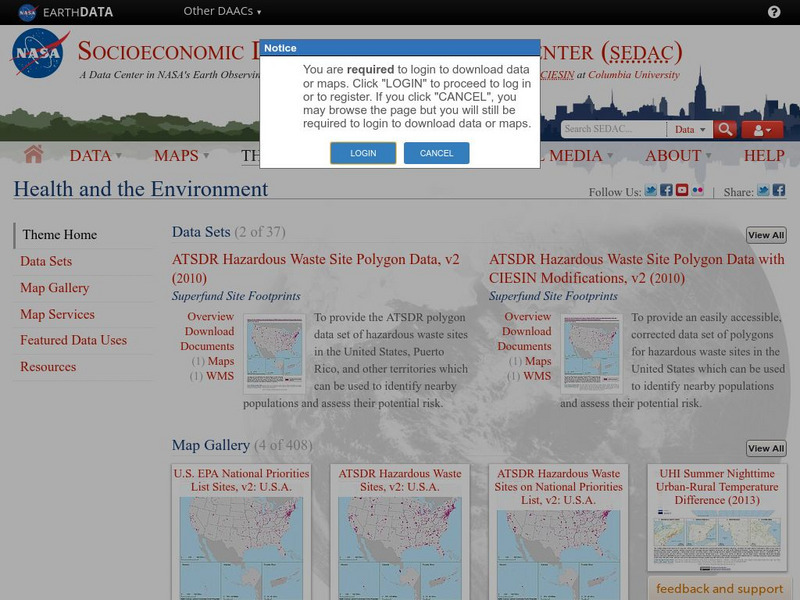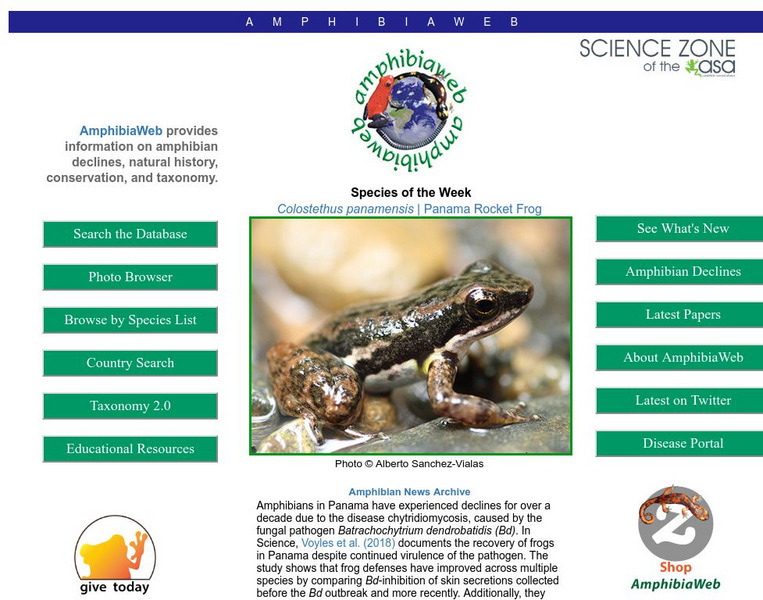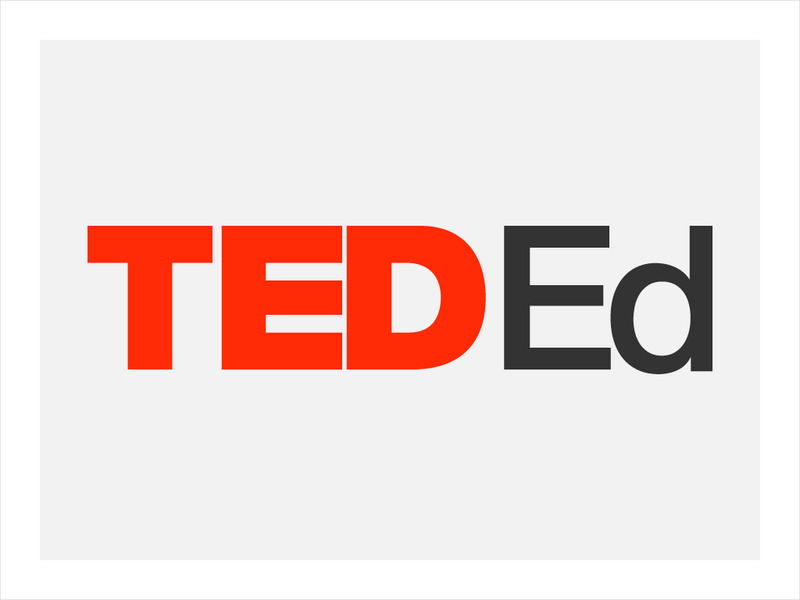Other
The Global Flow of People
Investigate estimates of migration flows between and within regions for five-year periods, 1990 to 2010. Click on a region to discover flows country-by-country.
Geographyiq
Geography Iq
Detailed geographical information on any country is available at this site. Within the World Map section, you can get facts and figures about each country's geography, demographics, government, political system, flags, historical and...
Annenberg Foundation
Annenberg Learner: Journey North: A Global Study of Wildlife Migration and Seasonal Change
Here you can view maps showing the migratory paths of dozens of animals across the northern hemisphere, report a sighting of one of the animals listed in the database, and much more.
Trinity University
Trinity University: Demography
Trinity University offers interesting statistics on the world's population; such as ethnicity, education, religion, gender, etc. Includes special links.
University of Saskatchewan (Canada)
University of Saskatchewan: Modelling Natural Growth
This site shows how to model exponential growth. The site walks the student through an example problem using logarithms to find the exponential growth of the theoretical world population.
Other
Green Global Travel: Endangered Species Spotlight: Alabama Beach Mouse
A quick overview about the endangered Alabama Beach Mouse along with conservation information about its population status.
Climate Literacy
Clean: Climate Change and Arctic Ecosystems
Students learn about how climate change is affecting the Arctic ecosystem, and then investigate how this change is impacting polar bear populations. Students analyze maps of Arctic sea ice, temperature graphs, and polar bear population...
National Wildlife Federation
National Wildlife: The Incredible Shrinking Polar Bears
This article, published by National Wildlife Magazine (February/March 2004 issue), offers an insightful look into the life of the polar bears of Canada's Hudson Bay. The article looks at why these bears are losing weight and bearing...
American Institute of Biological Sciences
Action Bioscience: Climate Change Threatens Penguins
More than half of the species of penguins are feeling the affects of global warming. Understand the impact of this climate change while reading this article and exploring the resources provided. Teacher resources available for students...
Curated OER
Animated Map of Human Population
This animated map shows world population growth from the year 1 to 2020 A.D. Note the changing years as you observe the growth on a map of the world.
Other
Temperate Forest Organization: Temperate Forest
Provides links to sites such as forestry, population, management, diversity, and fire. There are lesson plans, tours and educational links for teachers.
Central Intelligence Agency
Cia: World Fact Book: Homepage
Sponsored by the CIA, the World Fact Book gives current information about the world's countries and peoples. Includes geography, people, government, economy, communications, transportation, military, and transnational issues sections.
Exploratorium
Exploratorium: Global Climate Change: Biosphere
Explore real scientific data relating to the biosphere. With this information, you can gather evidence, test theories, and come to conclusions. Click on the data examples to view a full-scale version.
American Institute of Biological Sciences
Action Bioscience: The Global Decline of Mollusks
You can help! Species of mollusks are disappearing from our marine sources. While it might not be obvious to the casual beach-goer, these shelled creatures provide food and shelter, medical research, and help keep our waters clean.
Other
Miniature Earth: Comparative Demographics Worldwide
Miniature Earth reduces the world's population to 100 to underscore the dramatic differences in wealth, age, faith, education, environment, and health among people who live on this planet. An excellent apply-what-you-know site for...
Annenberg Foundation
Annenberg Learner: Bridging World History: Food, Demographics, and Culture
This unit probes into the role food plays in society in terms of culture, economy and global awareness since the primary globalization in the 1500s through videos, various readings, and activities.
Columbia University
Nasa: Sedac: Health and the Environment
[Free Registration/Login Required] A collection of twenty-three data sets from SEDAC (Socioeconomic Data and Applications Center) that examine health issues and how the environment impacts health in areas around the globe. They look at a...
Annenberg Foundation
Annenberg Learner: Bridging World History: Connections Across Water
Global exportation and importation increased when water routes opened up. This unit analyzes how this affected world trade as well as the spread of population, religion, and illness.
University of California
Regents of the University of California: Amphibia Web
AmphibiaWeb, a site inspired by global amphibian declines, is an online system that allows free access to information on amphibian biology and conservation. This site is filled with amphibian facts, a glossary of terms, species numbers,...
Royal Canadian Geographical Society
Canadian Geographic: A Developing World
CIDA, in partnership with Canadian Geographic, have created a resource which allows students to investigate the quality of life in over 200 countries by examining various Human Development Index indicators. Students may search by...
Other
Gapminder World: 200 Years That Changed the World
This interactive allows you to view graphs of a variety of things by selecting and comparing bubbles; drag the time slider, zoom in and out and turn trails on/off.
University of Texas at Austin
University of Texas: Understanding Migration [Pdf]
Why do people move? This curriculum unit tackles the complex questions about the causes of individual versus large-scale migration as well as the global effects of migration. Clear lesson plans and objectives are included.
TED Talks
Ted: Ted Ed: The Coming Neurological Epidemic
Biochemist Gregory Petsko makes a convincing argument that, in the next 50 years, we'll see an epidemic of neurological diseases, such as Alzheimer's, as the world population ages. His solution: more research into the brain and its...


